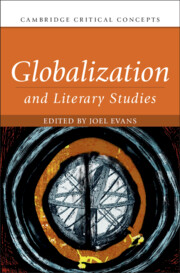Book contents
- Globalization and Literary Studies
- Cambridge Critical Concepts
- Globalization and Literary Studies
- Copyright page
- Contents
- Figures
- Tables
- Contributors
- Acknowledgements
- Introduction
- Part I Origins
- Chapter 1 The Ecology of Globalization
- Chapter 2 Forms of Premodern Literary Circulation
- Chapter 3 The End of History
- Chapter 4 Translation
- Chapter 5 Empire
- Part II Development
- Part III Application
- References
- Index
Chapter 1 - The Ecology of Globalization
Environmental Catastrophe and the History of Literature*
from Part I - Origins
Published online by Cambridge University Press: 01 April 2022
- Globalization and Literary Studies
- Cambridge Critical Concepts
- Globalization and Literary Studies
- Copyright page
- Contents
- Figures
- Tables
- Contributors
- Acknowledgements
- Introduction
- Part I Origins
- Chapter 1 The Ecology of Globalization
- Chapter 2 Forms of Premodern Literary Circulation
- Chapter 3 The End of History
- Chapter 4 Translation
- Chapter 5 Empire
- Part II Development
- Part III Application
- References
- Index
Summary
Literary innovation and geographical expansion often depend on mass extinction of literary forms. Ecological catastrophe strikes as cross-regional climate change, epidemic, or geological disaster. Sometimes aided by prior globalizing steps but always intertwined with social and cultural forces, it curtails population, globalization, literacy, and literature; delegitimates the old order; and undermines dominant literary modes. But when ecological conditions are again favorable, previously marginal literary forms come to prominence, a new cultural age emerges, and literary globalization advances. Literary history is shaped by this recurrent alternation. From 3300 BCE to 400 CE, climate change—aridity and global cooling—is the dominant ecological shock. From 150 to 1560 CE, these disruptive forces, together with volcanic eruptions, often set the stage for a hitherto unknown scourge, a new key driver made possible by increasing globalization—the pandemic. Beginning in the late 16th century, however, pandemics relatively recede. Climate change again dominates, first as global cooling, now as global heating. Throughout, ecological catastrophe is arguably the central force of creative destruction—temporarily undermining literature and literary globalization, ultimately enabling literary innovation and diffusion.
Keywords
- Type
- Chapter
- Information
- Globalization and Literary Studies , pp. 21 - 34Publisher: Cambridge University PressPrint publication year: 2022

